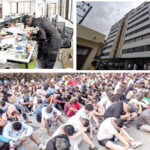The Court of Appeal in Abuja has nullified the prosecutorial powers of the Special Presidential Investigation Panel for the Recovery of Public Property (SPIP).
The decision of the court followed an appeal by the Tumsah brothers: Ibrahim and Tijani challenging the refusal of an FCT High Court to set aside the ex-parte order made on December 6, 2017 seizing their properties.
In a unanimous judgement delivered on Monday, the five-member panel of judges presided by Justice Husseini Mukhtar held that the SPIP has no power to apply for forfeiture of properties.
The court said that under Section 4(4) of the Recovery of Properties Special Provisions Act, the SPIP should report its findings and conclusions to the Head of the Federal Republic, Who will in turn submit same to the Economic and Financial Crimes Commission (EFCC) for action.
The appellate court ruled that the trial court arrived at its decision to grant the ex-parte application forfeiting the properties based on sentiment when it knew that it lacked the jurisdiction to make such order.
“It is very important that due process be followed in this corruption cases, and indeed in all other matters. The Special Investigation Panel having been set up under the Recovery of Properties Special Provisions Act and thus being a creation of statutes, its powers are indeed circumscribed by the statutes creating it,” the court said.
The SPIP led by the Special Adviser to the President on Anti-corruption, Okoi Obono-Obla had in December, 2017 through an ex-parte seized 86 cars from the Ibrahim Tumsah, a Director of Finance and Accounts in the Ministry of Works and Housing, and Tijani Tumsah.
Also seized were houses located at No 34 Euphrates Street, Wuse 2, Abuja; No 5 Sirasso Crescent, Wuse Zone 7, Abuja; a quarry plant at Kuje, Abuja; No 27 Cairo Crescent, Wuse 2, Abuja; and No 22 Igbani Street, Jabi, Abuja.
Counsel to the applicants, Kehinde Ogunwumiju (SAN) had in the appeal raised three main issues, which include among others that the suit for the forfeiture of the properties was not properly constituted by the SPIP, that the panel could not rely on the EFCC Act to make the application for forfeiture, and that the lower court was wrong when it refused to set aside the Interim forfeiture.

 Join Daily Trust WhatsApp Community For Quick Access To News and Happenings Around You.
Join Daily Trust WhatsApp Community For Quick Access To News and Happenings Around You.

